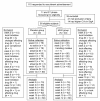Oral intake of Lactobacillus pentosus strain b240 accelerates salivary immunoglobulin A secretion in the elderly: A randomized, placebo-controlled, double-blind trial
- PMID: 20796295
- PMCID: PMC2936365
- DOI: 10.1186/1742-4933-7-11
Oral intake of Lactobacillus pentosus strain b240 accelerates salivary immunoglobulin A secretion in the elderly: A randomized, placebo-controlled, double-blind trial
Abstract
Background: Immunoglobulin A (IgA) secretion in saliva decreases with age and may be the cause of increased vulnerability of the elderly to respiratory infections. The effect of oral intake of lactic acid bacteria on salivary secretory IgA (SIgA) in the elderly has not been reported. The objective of this study was to demonstrate the acceleration of salivary SIgA secretion by oral intake of Lactobacillus pentosus strain b240 (b240) in the elderly.
Results: A total of 80 healthy elderly individuals were randomly allocated to either an intervention (i.e., b240) or a control (i.e., placebo) group. The elderly individuals in the b240 group were given a sterile water beverage (125 mL) containing heat-killed b240 (4 × 109 cells), while those in the placebo group were given only a sterile water beverage (125 mL); both groups received their respective beverages once daily for 12 weeks. Saliva was collected before initiation of the study and every 2 weeks thereafter. Saliva flow rate and SIgA concentration were determined, and the SIgA secretion rate was calculated. The mean salivary SIgA secretion rate in the b240 group steadily increased until week 4 (exhibiting a 20% elevation relative to that at week 0), and then remained stable until week 12. Changes in SIgA secretion rate over the intervention period were significantly greater in the b240 group than in the placebo group. The treatment groups exhibited no significant differences in adverse events.
Conclusions: Oral intake of L. pentosus strain b240 for 12 weeks significantly accelerated salivary SIgA secretion, thereby indicating its potential utility in the improvement of mucosal immunity and resistance against infection in the elderly.
Figures




Similar articles
-
The effects of Lactobacillus pentosus strain b240 and appropriate physical training on salivary secretory IgA levels in elderly adults with low physical fitness: a randomized, double-blind, placebo-controlled trial.J Clin Biochem Nutr. 2014 Jan;54(1):61-6. doi: 10.3164/jcbn.13-62. Epub 2013 Nov 26. J Clin Biochem Nutr. 2014. PMID: 24426193 Free PMC article.
-
Immunoprotective effects of oral intake of heat-killed Lactobacillus pentosus strain b240 in elderly adults: a randomised, double-blind, placebo-controlled trial.Br J Nutr. 2013 May 28;109(10):1856-65. doi: 10.1017/S0007114512003753. Epub 2012 Sep 5. Br J Nutr. 2013. PMID: 22947249 Clinical Trial.
-
Oral administration of heat-killed Lactobacillus pentosus strain b240 augments protection against influenza virus infection in mice.Int Immunopharmacol. 2011 Feb;11(2):199-203. doi: 10.1016/j.intimp.2010.11.019. Epub 2010 Nov 21. Int Immunopharmacol. 2011. PMID: 21095259
-
Dietary intake of Agaricus bisporus white button mushroom accelerates salivary immunoglobulin A secretion in healthy volunteers.Nutrition. 2012 May;28(5):527-31. doi: 10.1016/j.nut.2011.08.005. Epub 2011 Nov 23. Nutrition. 2012. PMID: 22113068 Clinical Trial.
-
Randomized, double-blind, placebo-controlled, parallel-group study of the effect of Lactobacillus paracasei K71 intake on salivary release of secretory immunoglobulin A.Biosci Microbiota Food Health. 2017;36(2):55-63. doi: 10.12938/bmfh.16-022. Epub 2016 Dec 28. Biosci Microbiota Food Health. 2017. PMID: 28439488 Free PMC article.
Cited by
-
The gut microbiome as a modulator of healthy ageing.Nat Rev Gastroenterol Hepatol. 2022 Sep;19(9):565-584. doi: 10.1038/s41575-022-00605-x. Epub 2022 Apr 25. Nat Rev Gastroenterol Hepatol. 2022. PMID: 35468952 Free PMC article. Review.
-
Daily intake of fermented milk with Lactobacillus casei strain Shirota reduces the incidence and duration of upper respiratory tract infections in healthy middle-aged office workers.Eur J Nutr. 2017 Feb;56(1):45-53. doi: 10.1007/s00394-015-1056-1. Epub 2015 Sep 29. Eur J Nutr. 2017. PMID: 26419583 Free PMC article. Clinical Trial.
-
Genome sequence of Lactobacillus pentosus IG1, a strain isolated from Spanish-style green olive fermentations.J Bacteriol. 2011 Oct;193(19):5605. doi: 10.1128/JB.05736-11. J Bacteriol. 2011. PMID: 21914902 Free PMC article.
-
Immunomodulatory effects of a probiotic drink containing Lactobacillus casei Shirota in healthy older volunteers.Eur J Nutr. 2013 Dec;52(8):1853-63. doi: 10.1007/s00394-012-0487-1. Epub 2013 Jan 10. Eur J Nutr. 2013. PMID: 23307112 Clinical Trial.
-
Protective efficacy of orally administered, heat-killed Lactobacillus pentosus b240 against influenza A virus.Sci Rep. 2013;3:1563. doi: 10.1038/srep01563. Sci Rep. 2013. PMID: 23535544 Free PMC article.
References
-
- Mestecky J, Lamm ME, McGhee JR, Bienenstock J, Mayer L, Strober W. Mucosal Immunology. 3. San Diego, CA: Academic Press; 2005.
LinkOut - more resources
Full Text Sources
Other Literature Sources
Miscellaneous

